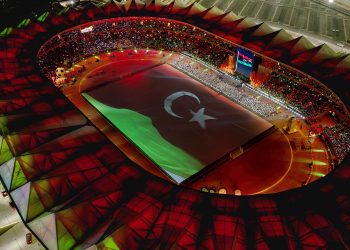By Feras Gadamsi
So let me be the first to admit the dirty little secret that hasn’t really been a secret to . . .[restrict]those who personally know me.
Yes, I would have shaken his hand. Guilty as charged.
“His hand” would be that of Saif Qaddafi. Before the revolutionary uprising, I can honestly say that if I had met Saif, by chance or planned meeting, I would have shaken his hand.
And yes, I did try to engage several clients in Libya that were working under the control of the former regime. Working as a lawyer for a private U.S.-based law firm, it was my job to help land clients like sovereign wealth funds.
Am I ashamed? No. Did I do it with the motive of helping my career? Yes. Do I consider myself a criminal? Hardly.
Will I live with guilt for having ever believed a word Saif or any of his cronies said? Yes, but I don’t need any law or a bunch of politicians to tell me that.
My point is that in a world that most of us wish were black and white, several shades of gray exist, so to freeze assets, without due process or the means to challenge even the application of Law No. 36, to a broad list of companies and individuals seems to me, as a Libyan citizen, lawyer, and layman, to be a breach of the fundamentals for which our revolutionaries fought in overthrowing Qaddafi.
I never landed any of the clients I went after in Libya, but I might have had the regime continued. Don’t get me wrong – I was never a Qaddafi sympathiser, but I was pragmatic. I feel duped and naïve in thinking that the regime could be, at the very least, more open to reform in the coming years, but I was hardly alone in that.
Any Libyan, including those that actively fought, militarily or otherwise, against the regime during the revolution, is kidding themselves if they thought Qaddafi would be dead and gone 16 months ago. Perhaps his death may have been plausible due to natural causes, but not because of the overthrow of his tyrannical regime.
Instead, most Libyans, including myself, became pragmatists. Academics, businessmen and women, professionals, laymen and women…this majority included all types of Libyans. We were resigned to the conclusion that the fortunes of this country could not be changed by war, but by trying to make the most of a cup that was never even half-empty.
We tried to push forward reform agendas. We tried to create business and investment in Libya in order to produce jobs in the private sector. We tried our best to make the situation inside Libya better despite the former regime’s push against development.
Thus lies the quandary for the politicians who devised these laws. In their zest to proactively pursue perpetrators who were known active regime supporters and sympathisers, their net of “justice” is picking up people, either by accident or spite depending on what you believe, in a vain attempt to apply collective punishment measures based on assumptions and accusations not necessarily grounded in fact.
Don’t get me wrong. I do admire those that continued the fight in spite of the seemingly impossible odds, and they do hold currency in the new Libya that the pragmatists will never be able to flash. Many of them are in the new government and relishing their ability to wield power after years, decades in some cases, of abuse and torture at the hands of a relentlessly brutal regime.
They are the reason why this revolution was successful – they never let the weed die. And they have every right to speak from a position of principle. And this currency should serve them well when debating against the likes of me or in pursuit of political office.
But revenge has hardly been the sort of motivation that produces the characteristics that citizens look for in their statesmen.
Revenge does not give people the right to indict people as traitors or accomplices to murder or criminal masterminds that supported the regime when in many cases many were trying to make lemonade out of the expired, beat-up and rancid lemons that were handed out by the old regime.
And despite the suffering of the past, any political currency the NTC has for being brave enough to challenge Qaddafi during the early days of this revolution does not give them the right to point the finger at others who were simply trying to make the most of an intolerable situation. Indeed, wasting that currency by passing laws that demean the very principles they fought for is a saddening sight and waste of their efforts.
All of these laws – Law No. 36, Law No. 37, and Law No. 38 – and their broad application certainly do not bode well for the new Libya. Replacing old tyrants with new tyrants is not why Libyans pushed for this revolution.
Instead of casting stones without judicial inquiry in the name of cleansing ourselves from anything in the past that is Qaddafi-related through an asinine form of collective punishment where allegations are facts and guilt is assumed prior to innocence, let’s honor the sacrifice of our martyrs by passing laws that honor their legacy.
Let’s pass laws that make it easier for Libyans to prosper through better access to education and healthcare and the development of better roads, airports, and infrastructure that will create jobs and sustainability in the new Libya.
After all, the sacrifice of our martyrs was done for a better tomorrow in Libya, not to repeat history by allowing old men with axes to grind to pass new laws in order to produce the same old and tired results.
Feras Gadamsi was born and raised in the United States and currently resides in the Emirate of Dubai. He is a U.S.-trained, Libyan lawyer practicing in the UAE. [/restrict]




